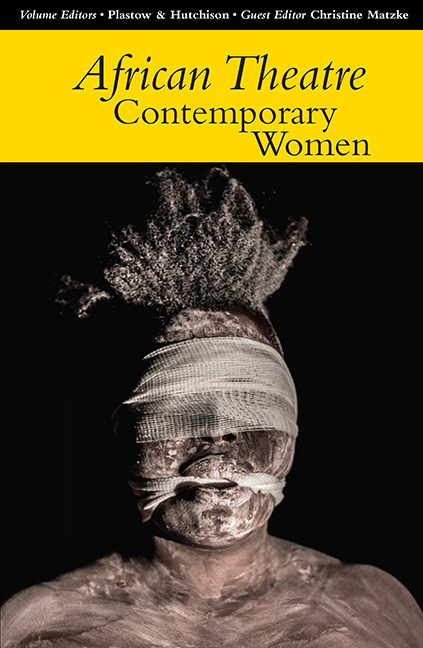Book contents
- Frontmatter
- Contents
- Notes on Contributors
- Editors’ Foreword: Women on the Front Line
- Introduction: Citizen & Artist: African women making theatre
- The Work of Dalia Basiouny: An artist's account
- Performativities as Activism: Addressing gender-based violence & rape culture in South Africa & beyond
- Exploring Poetic Voice in the Uganda Women's Intergenerational Theatre Project
- ‘After Images’: Impressions of the ‘after’ by South African performerchoreographer Mamela Nyamza
- Jalila Baccar of Tunisia: A portrait of an artist
- In Conversation: Interrogating & shifting societal perceptions of women in Botswana through theatre
- Binti Leo: Women in the arts in Tanzania
- Odile Gakire Katese: Making art & reinventing culture with women
- Contemporary Ethiopian Actresses
- Introducing The Sentence
- Playscript
- Book Reviews
Introducing The Sentence
Published online by Cambridge University Press: 05 July 2016
- Frontmatter
- Contents
- Notes on Contributors
- Editors’ Foreword: Women on the Front Line
- Introduction: Citizen & Artist: African women making theatre
- The Work of Dalia Basiouny: An artist's account
- Performativities as Activism: Addressing gender-based violence & rape culture in South Africa & beyond
- Exploring Poetic Voice in the Uganda Women's Intergenerational Theatre Project
- ‘After Images’: Impressions of the ‘after’ by South African performerchoreographer Mamela Nyamza
- Jalila Baccar of Tunisia: A portrait of an artist
- In Conversation: Interrogating & shifting societal perceptions of women in Botswana through theatre
- Binti Leo: Women in the arts in Tanzania
- Odile Gakire Katese: Making art & reinventing culture with women
- Contemporary Ethiopian Actresses
- Introducing The Sentence
- Playscript
- Book Reviews
Summary
In October 2011 the Theater Krefeld/Mönchengladbach, Germany, staged the overall world premiere of Sefi Atta's play The Sentencein a German translation. Drawing on judicial sentences of death by stoning in northern Nigeria in the early 2000s, The Sentencerecounts the story of a Muslim woman unjustly sentenced to death for adultery. As the play progresses the protagonist not only becomes a symbol of injustice in the Nigerian and international media. It also transpires that she has been interpellated, and actively participates in a system based on gender inequality and religious bigotry. Atta adapted the play from a short story, ‘Hailstones on Zamfara’, which was initially conceived as a monologue and later published in her collection of short stories, Lawless and Other Stories(2008) (US/UK edition: News from Home(2010)). In 2011 Salzburg-based Nigerian director Nicholas Monu directed the play at Krefeld/Mönchengladbach as part of their ‘non- European theatre’ programme. The series had been initiated by the director of drama, Matthias Gehrt, in 2010 to stage productions other than the common staples of German municipal theatres (Stadttheater) – Northern classics, comedy and increasingly musicals – by introducing one new non- European drama per season (Matzke 2013). Each play was to be translated into German and performed by the Krefeld/Mönchengladbach company, but directed by someone closer to its dramatic context: hence the choice of Monu to direct Atta. Monu was familiar with Atta's work and had already directed another of her plays, The Cost of Living, at Terra Kulture in Lagos earlier that year.
Atta herself is a US-based Nigerian, best known as a novelist and writer of short stories. She is the author of Everything Good Will Come(2005) for which she received the first Wole Soyinka Prize for Literature in Africa in 2006, Swallow(2010) and her more recent A Bit of a Difference(2013). Little is known of her dramatic work for radio, stage and screen, even though, according to a recent interview, she prefers writing plays to any other genre (Geosi Reads 2013). To date, Atta has five stage plays to her credit, none of them published, but all of them produced (http://www.sefiatta.com/plays.html).
- Type
- Chapter
- Information
- African Theatre 14: Contemporary Women , pp. 109 - 112Publisher: Boydell & BrewerPrint publication year: 2015



